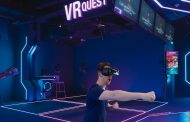Improving The In-Class Experience – Virtual Reality in Education
Education should constantly be evolving in a rapidly changing world. Education must catch up with new ways of teaching and, more importantly, learn to keep up with new ways of learning. Virtual reality is one of today’s most promising and progressive technologies that can help with this.
Why should we consider virtual reality to improve education and learning experiences? Because cutting-edge technology like virtual reality can benefit us all greatly. It allows us to have amazing experiences and mind-blowing moments and get awesome assignments from like Aleks Answers.
Here are the top five advantages of virtual reality in education.
Simple Access
Everyone can have a piece of the pie with virtual reality. In this context, an equal share of education would suffice. In addition, because of VR technology, education is no longer considered a stigma.
There are people, primarily children, who face barriers to education due to various factors ranging from disability to distance. VR removes those barriers; it enables a quick start with any lesson.
Everything is exactly in place and can be easily moved if necessary. However, it is a known fact that teachers are constantly looking for better ways to educate children, including children with special needs and requirements.
Furthermore, it is also known that certain teachers use virtual reality to teach autistic children. For example, they teach manners and actions like steps to cross the street and better prepare them for life outside the classroom.
Entertainment
The best learning outcomes occur when you are involved and have the opportunity to try something, fail, and then do it correctly. Nothing beats firsthand experience, and virtual reality enables this. VR technology allows the teachers to ‘gamify’ even the most basic lessons, such as ‘open the tab’ or ‘close the door,’ into a more complex multiplayer experience.
Even better, gamification can be easily incorporated into the lesson topic. In a Stone Age era VR workshop, for example, students can play a game of carving stone or making a stone axe and learn about ancient people’s lifestyles.








